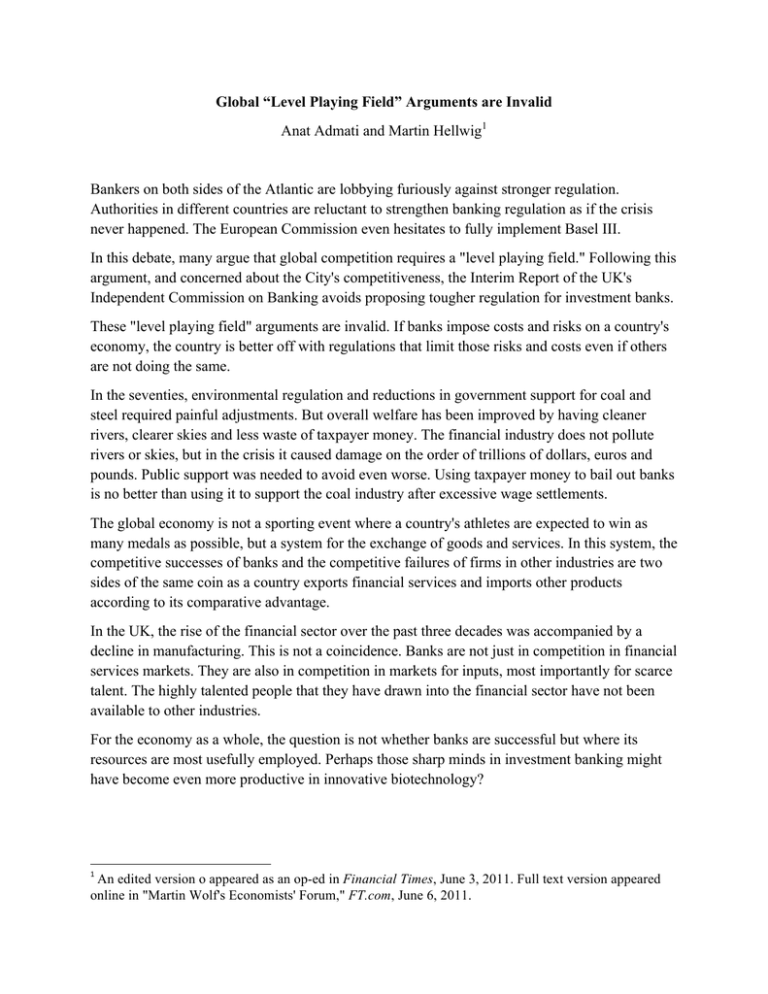Global “Level Playing Field” Arguments are Invalid
advertisement

Global “Level Playing Field” Arguments are Invalid Anat Admati and Martin Hellwig1 Bankers on both sides of the Atlantic are lobbying furiously against stronger regulation. Authorities in different countries are reluctant to strengthen banking regulation as if the crisis never happened. The European Commission even hesitates to fully implement Basel III. In this debate, many argue that global competition requires a "level playing field." Following this argument, and concerned about the City's competitiveness, the Interim Report of the UK's Independent Commission on Banking avoids proposing tougher regulation for investment banks. These "level playing field" arguments are invalid. If banks impose costs and risks on a country's economy, the country is better off with regulations that limit those risks and costs even if others are not doing the same. In the seventies, environmental regulation and reductions in government support for coal and steel required painful adjustments. But overall welfare has been improved by having cleaner rivers, clearer skies and less waste of taxpayer money. The financial industry does not pollute rivers or skies, but in the crisis it caused damage on the order of trillions of dollars, euros and pounds. Public support was needed to avoid even worse. Using taxpayer money to bail out banks is no better than using it to support the coal industry after excessive wage settlements. The global economy is not a sporting event where a country's athletes are expected to win as many medals as possible, but a system for the exchange of goods and services. In this system, the competitive successes of banks and the competitive failures of firms in other industries are two sides of the same coin as a country exports financial services and imports other products according to its comparative advantage. In the UK, the rise of the financial sector over the past three decades was accompanied by a decline in manufacturing. This is not a coincidence. Banks are not just in competition in financial services markets. They are also in competition in markets for inputs, most importantly for scarce talent. The highly talented people that they have drawn into the financial sector have not been available to other industries. For the economy as a whole, the question is not whether banks are successful but where its resources are most usefully employed. Perhaps those sharp minds in investment banking might have become even more productive in innovative biotechnology? 1 An edited version o appeared as an op-ed in Financial Times, June 3, 2011. Full text version appeared online in "Martin Wolf's Economists' Forum," FT.com, June 6, 2011. The best uses of scarce resources are found through an undistorted market system. Without distortions, a firm's success in the competition for inputs is prima facie evidence that its use of these resources is economically desirable. However, with externalities such as health effects of pollution, job and income losses from the fallout of the financial crisis, or costs of government subsidies, market functioning is distorted. It is important to correct such distortions by suitable regulation. The elimination of distortions favoring banks will improve the functioning of the market system and enhance economic welfare. The severity of the crisis was at least partly due to the fact that major financial institutions operated with only 1-3 per cent equity relative to total assets. With such high leverage, solvency concerns arose quickly and impaired refinancing. Had banks been funded with much more equity, the crisis would have been much less severe. Basel III allows the total equity of banks to be as low as 3% of their total assets, which is dangerously low. A system where banks, including investment banks, are funded with significantly more equity is not only less fragile, but it is healthier, with fewer incentives for excessive risk taking and a lower likelihood of a credit crunch due to overhanging debt. Banks funded with more equity can better generate economically appropriate value and profits by making loans and providing liquidity, while subjecting the economy to fewer unnecessary risks and costs. Arguments based on banks' return-on-equity are fallacious and irrelevant, as are dire predictions for national competitiveness, lending and growth. None of these should enter the debate. Some argue that stricter regulation would drive banking into the unregulated shadows. By the same argument, we might give up on taxation because we are afraid of the use of tax loopholes. Enforcing financial regulation is a challenge, but this challenge can be met. In the crisis, the most problematic shadow banking activities had actually been sponsored by regulated banks, and would have been within regulatory reach. If national supervisors were willing to use their enforcement powers over activities in their territory, the threat from shadow banking anywhere would be much reduced. This requires political will and determination.


